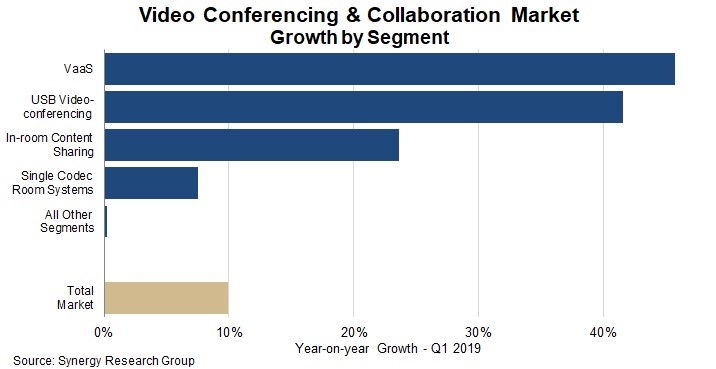The Q1 video conferencing and collaboration market grew 10% year on year in 2019
New data from Synergy Research shows the Q1 market for video conferencing and collaboration growing by 10% year on year to reach well over $1.5 billion, with the market being increasingly driven by two relatively small but high-growth segments – VaaS (video as a service) and USB video conferencing. These two segments each grew by well over 40%. Other high-growth segments include in-room content sharing and collaborative smart boards. Meanwhile traditional single codec room systems remain a foundation of the market, accounting for a quarter of all spending and continuing to grow by 8%. Cisco and Poly (the renamed Polycom) lead by a wide margin in the videoconferencing and dedicated video desktop segments, while Cisco and LogMeIn are the leaders in conferencing SaaS. Among the major vendors, Zoom has by far the highest growth rate, followed at a distance by Logitech and BlueJeans. Traditional video vendors are also targeting the newer segments, an example being Poly which has quickly established itself as the number three ranked vendor in USB video conferencing.

Over the next five years, Synergy forecasts that annual growth will approach 10% with increased spending in all major geographic regions. The two stand-out segments for growth will remain VaaS and USB video conferencing, which in aggregate will account for well over a third of the market by 2023.
“The video market continues to evolve from traditional single codec systems to newer more nimble USB video rooms and VaaS cloud services, which are helping vendors to target pent-up demand at the smaller end of the video market,” said Jeremy Duke, Synergy Research Group’s founder and Chief Analyst. “These USB and VaaS solutions are also now gaining traction in the mid-market and with large enterprises, helping to expand the overall market opportunity. The ability of Zoom to double in size year on year is clear evidence of buoyant demand for video, while we will still see growth in many of the more traditional segments over the next five years.”
